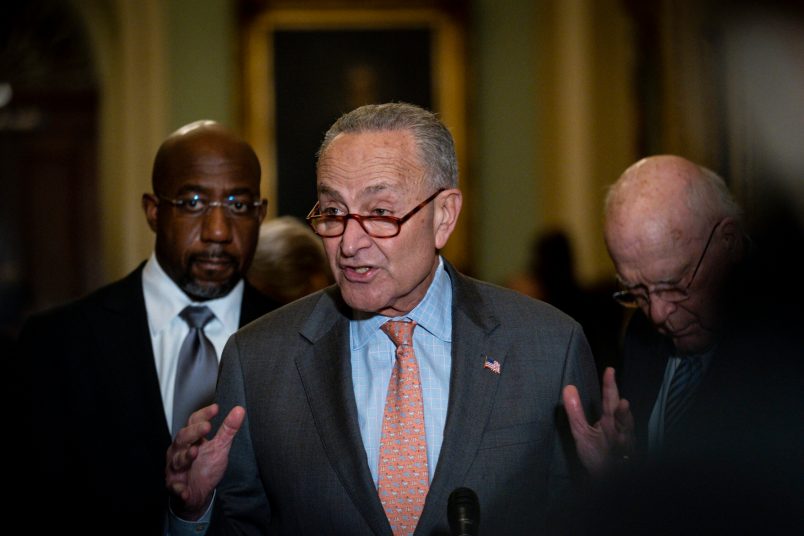This post has been updated.
Senate Republicans on Wednesday blocked an attempt to move forward with the John Lewis Voting Rights Advancement Act. Like other attempts to pass voting rights legislation this year, even a formal debate on the bill could not pass Republicans’ use of the filibuster.
A majority of the Senate supported moving forward with bill, which would reconstruct some of the Voting Rights Act (VRA) “preclearance” provisions that were gutted by the Supreme Court in 2013, as well as other parts of the 1965 law that were weakened by another Supreme Court ruling earlier this year.
Sen. Joe Manchin (D-WV), the lone Democratic hold out on the legislation over the summer, announced his support for a slightly-amended version of the bill on Tuesday. Sen. Lisa Murkowski (R-AK) also supports that legislation as well; for months, she’s been the only Republican signed onto the effort.
The cloture vote to move forward with debate on the bill failed to surpass the 60-vote bar necessary to overcome a filibuster.
The vote was 50-49, with Murkowski the lone Republican in support. Senate Majority Leader Chuck Schumer (D-NY) switched his vote, a procedural maneuver so that the Senate could take up the measure at a later date.
“The party of Lincoln is becoming the party of the Big Lie,” Schumer said after the vote.
So the focus, again, is on the filibuster. Just like the Freedom To Vote Act, which Republicans blocked from receiving a debate two weeks ago, the failure of the motion to begin debate on the John Lewis Voting Rights Advancement Act is just the latest episode to demonstrate how the arcane Senate rules have stopped progress on Democrats’ priorities.
“If they’re not going to do this, then we have to look at what’s next, and I believe that is restoring the Senate,” Sen. Amy Klobuchar (D-MN) told reporters Tuesday, referring to Republicans’ intransigence. “We can’t deny debate.”
“They are literally stopping us from debating something,” she said, adding later: “At some point, our democracy has to move along, so that’s a discussion we’ll be having.”
Sens. Manchin and Kyrsten Sinema (D-AZ) are alone among Democrats for their opposition to changing the filibuster rules, at least publicly.
And every time Republicans use the maneuver to prevent a vote on legislation that would have garnered a Senate majority — as happened recently with the Freedom to Vote Act, another voting rights proposal that both Democrats support — attention turns to the two senators, and their refusal to budge on the subject.
Asked Tuesday whether Democrats had coalesced around a strategy for reforming the filibuster, Klobuchar didn’t give specifics.
“When we say ‘restore the Senate,’ we’re going to look at all of our options to try to move things along here,” she said.
Bill Aims To Repair SCOTUS Damage To Voting Rights Act
The House passed an earlier version of the John Lewis Voting Rights Advancement Act along party lines in August.
The proposal would rebuild the “preclearance” language of the Voting Rights Act, which was gutted by the Supreme Court in 2013, by requiring that states with a history of discrimination be subject to 10 years of preclearance — meaning, they must receive approval from the Justice Department or the Washington, D.C. District Court before making changes that would affect voting rights.
The bill would also address the Supreme Court decision earlier this year that weakened Section 2 of the VRA, Brnovich v. Democratic National Committee, by instructing courts to take a broad view of whether state changes to voting laws have a discriminatory impact on voters, such as in redistricting cases or laws that restrict voter access.
The “compromise” version of the legislation announced Tuesday changes things slightly, though the overall structure of the bill stays the same. One change in the compromise proposal excludes so-called “line warming” laws, which restrict food and drinks passed out to voters waiting in long lines, from practice-based preclearance requirements.
Democrats’ (and in this case, Murkowski’s) push to protect voting rights came as Republican legislatures around the country pass bills to restrict those rights, fueled in part by Donald Trump’s lies about widespread voter fraud in the last election and a series of Supreme Court decisions, most notably 2013’s Shelby County v. Holder, that have weakened voter protections.
“In most of the states where Black voter turnout had surged prior to Shelby County, white voter turnout rates once again far exceed rates for Black voters,” Brennan Center for Justice President Michael Waldman observed Tuesday, pointing to research from the group covering years of voter turnout statistics.
Speaking after Wednesday’s vote, Vice President Kamala Harris said Americans’ voting rights were in “peril.”
“It is a shame that nearly every Republican in the United States Senate refused to even allow a debate on this issue,” Harris said, though she did not specifically discuss efforts to change the Senate’s filibuster rules.
“As anyone who has been here for more than a few years knows, the gears of the Senate have ossified over the years,” Schumer said in a floor speech following the vote, noting the spike in filibuster use in recent years. He called on the colleagues to “explore whatever path we have to restore the Senate, so it does what it framers intended: Debate, deliberate, compromise and vote.”
“We can’t be satisfied in this chamber with thinking that democracy will always win out in the end if we aren’t willing to put in the work to defend it,” the majority leader said.
Kate Riga contributed reporting.



